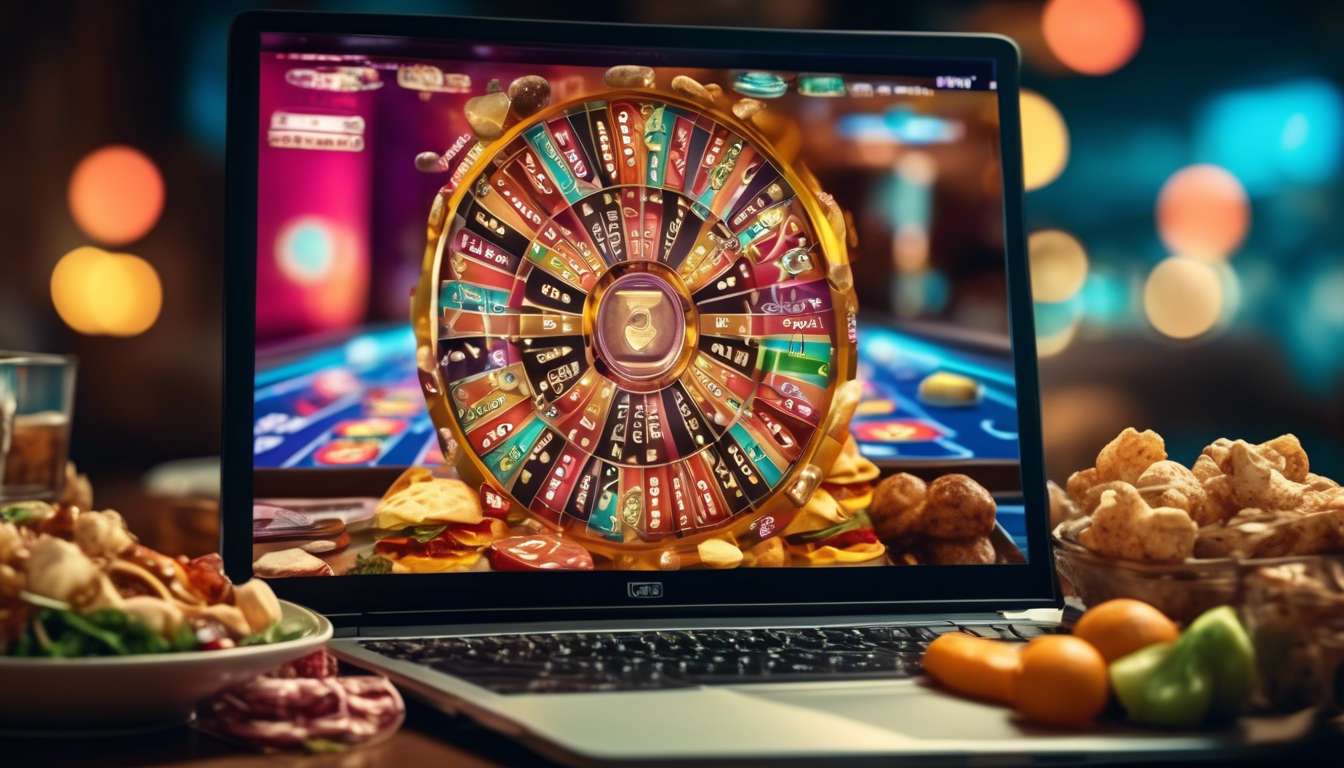In our modern digital age, the lines between various online activities continue to blur, creating fascinating intersections that challenge traditional concepts of both entertainment and wellness. Social dieting websites are a prime example, where these platforms legally mimic the structure and allure of online gambling.
Together, we navigate a landscape where users are not merely chasing weight loss goals, but are also engaging in a gamified experience that promises both rewards and risks. These sites leverage psychological triggers similar to those found in gambling, enticing us with the prospect of financial incentives tied to our health achievements.
By exploring the parallels between these dieting platforms and online gambling, we uncover a nuanced discussion about:
- Motivation: How financial incentives can drive users to achieve their dieting goals.
- Accountability: The role of community and peer pressure in maintaining commitment.
- Ethical Implications: The potential risks and moral concerns surrounding the use of gambling-like tactics.
How do these virtual arenas impact our behaviors and perceptions of dieting? Join us as we unravel this intriguing phenomenon.
The Rise of Social Dieting Platforms
In recent years, we’ve seen a significant surge in the popularity of social dieting platforms as people seek community support for their health journeys. These platforms offer a unique blend of connection and motivation, providing us with a sense of belonging and accountability.
By sharing our progress, struggles, and victories, we create a supportive network that encourages us to stay committed to our goals.
Social dieting leverages behavioral economics to tap into our desire for social interaction and positive reinforcement. By understanding how we make decisions, these platforms design incentives that keep us engaged and motivated.
The integration of gamification elements, like rewards and challenges, transforms the dieting experience into an interactive and enjoyable journey. This approach not only makes the process more engaging but also helps us stay on track by turning mundane tasks into exciting goals.
Together, we’re discovering that achieving health goals is more attainable and enjoyable when we’re part of a community that supports and celebrates our successes.
Gamification of Health Goals
Incorporating game-like elements into our health routines transforms mundane tasks into exciting challenges that keep us motivated and engaged. By embracing gamification, we can turn our social dieting efforts into a collective journey where we all strive for better health together.
We’re not just checking off calorie counts; we’re earning points, unlocking achievements, and climbing leaderboards. This shared experience fosters a community spirit, making us feel part of something larger than ourselves.
Gamification taps into our intrinsic desire for accomplishment and connection, harnessing principles from behavioral economics to influence our choices. When we participate in social dieting, we benefit not only from the support of our peers but also from structured incentives that encourage us to stick to our goals.
- We celebrate successes together.
- We learn from setbacks.
- Every small victory feels significant.
- Every setback is a chance to rally support.
Together, we’re redefining health as an engaging and rewarding adventure.
Behavioral Economics in Dieting
We can enhance our dieting strategies by applying insights from behavioral economics to understand and influence our decision-making processes.
Social Dieting:
- By recognizing the power of social dieting, we create supportive networks that motivate us to stick to our health goals.
- The sense of community fosters accountability, making our dieting journey less isolating and more enjoyable.
Gamification:
- A key concept in behavioral economics, gamification transforms our dieting experience into an engaging challenge.
- By setting small, achievable goals, we gain a sense of accomplishment and motivation to continue.
- We can use:
- Points
- Badges
- Leaderboards
- These tools help celebrate our progress and encourage friendly competition within our social dieting groups.
Cognitive Biases:
- Behavioral economics helps us identify cognitive biases that might derail our efforts, such as overconfidence or procrastination.
- By acknowledging these tendencies, we can craft strategies to overcome them, ensuring we stay on track.
Together, we can harness these insights to build healthier habits and create a supportive environment that empowers everyone in our community.
Incentivizing Healthy Habits
Motivating Healthier Habits Through Rewards and Recognition
By offering tangible rewards and recognition, we can motivate individuals to adopt and maintain healthier habits. Social dieting platforms utilize gamification to transform the often daunting task of dieting into an engaging and rewarding experience. We know that when our efforts are acknowledged and rewarded, we’re more likely to stick to our goals.
Role of Behavioral Economics
Behavioral economics plays a crucial role here, as it helps us understand how incentives can drive decision-making and encourage persistence. By creating a virtual environment where progress is visibly rewarded, we create a sense of community and belonging.
Creating a Sense of Community
We all want to feel part of a group working towards a common goal, and social dieting provides just that. Gamification elements tap into our natural competitiveness and desire for achievement. These elements include:
- Badges
- Leaderboards
- Small financial incentives
Harnessing Gamification for Long-lasting Habits
Together, we can harness these tools to promote long-lasting, healthy habits, making the journey toward wellness a shared and celebrated experience.
Community Support and Peer Pressure
Building a Robust Support Network
We can leverage community dynamics and peer pressure to encourage healthier lifestyle choices. Social dieting platforms offer the opportunity to connect with like-minded individuals who share similar goals.
By participating in these communities, we feel part of something bigger than ourselves, fostering a sense of belonging and commitment. This collective momentum makes it easier to stay on track, as we celebrate victories and navigate challenges together.
Utilizing Gamification
Through gamification, these platforms utilize behavioral economics to motivate us. Fun challenges and rewards create an engaging atmosphere, turning weight loss or healthy living into a shared adventure.
Our competitive spirits thrive as we compete in friendly contests, pushing each other towards success. Peer pressure, often seen negatively, transforms into a positive force, nudging us to make smart choices.
Embracing a Supportive Environment
When we embrace this supportive environment, we reinforce our dedication to personal goals. By relying on community support, we enhance accountability and foster lasting change in our lives.
Regulatory Considerations for Social Dieting
We must navigate various regulatory challenges to ensure that social dieting platforms remain safe and effective for all users. As we embrace gamification and behavioral economics in social dieting, it’s essential to maintain a balance between motivation and user protection. These platforms often mimic online gambling structures, making it crucial to implement safeguards that prevent harm while fostering a supportive environment.
We’re all in this together, striving for healthier lifestyles, and regulations must reflect our community’s shared values and goals. By focusing on:
- Transparency
- Privacy
- Ethical use of data
we can build trust and encourage positive interactions. It’s important to establish clear guidelines for gamification elements, ensuring they enhance rather than exploit user engagement.
Moreover, considering the psychological impact of these strategies, we must work with experts to create frameworks that promote well-being and avoid addictive behaviors. Through collaboration and thoughtful regulation, we can make social dieting a positive, empowering experience for everyone involved.
Impact on User Motivation
Boosting Motivation Through Community and Gamification
By leveraging engaging features and community support, we can significantly boost users’ motivation to achieve their health goals. Social dieting websites utilize gamification and behavioral economics to create an environment where users feel part of a supportive community. Sharing progress and achievements with others fosters a sense of belonging, encouraging us to stay committed to our health journeys.
Gamification Elements
Gamification adds an element of fun and challenge, transforming mundane tasks into rewarding experiences. By incorporating elements like:
- Points
- Badges
- Leaderboards
we can tap into our intrinsic motivation to compete and succeed. These features not only make the process enjoyable but also help sustain long-term engagement.
Role of Behavioral Economics
Behavioral economics plays a crucial role in motivating us by designing incentives that align with our goals. Key strategies include:
- Small, achievable milestones
- Positive reinforcement
These strategies drive consistent progress. When we see others succeed, it inspires us to push harder.
Together, these strategies create a dynamic and motivating environment, empowering us to reach our wellness aspirations.
Balancing Rewards and Risks
While pursuing wellness goals through social dieting websites, we must carefully weigh the rewards of motivation against the potential risks of developing unhealthy habits.
Social dieting platforms, leveraging gamification, promise a community-driven approach that can engage us and make our journey more enjoyable. They tap into behavioral economics, offering incentives like points and badges to keep us on track. This shared experience can be incredibly motivating, especially when we celebrate achievements together.
However, it’s crucial that we don’t let the excitement of these rewards overshadow our health. Gamification can sometimes lead us to prioritize quick wins over sustainable habits.
To maintain a healthy balance, consider the following:
- Focus on long-term wellness rather than short-lived victories.
- Be aware of the potential risks to make informed choices.
- Use these platforms in a way that supports your goals without compromising well-being.
Let’s encourage each other to find balance in our shared journey, ensuring our focus remains on sustainable habits and long-term health.
Conclusion
You’ve explored how social dieting sites cleverly mirror online gambling to motivate users. By tapping into behavioral economics and gamification, these platforms incentivize healthy habits through rewards and peer support.
However, regulatory concerns loom as the line between motivation and addiction blurs.
As you navigate these platforms, remember to balance the benefits with the risks, ensuring your health goals remain the top priority.




